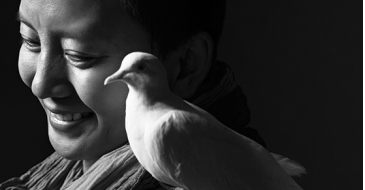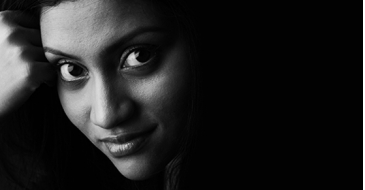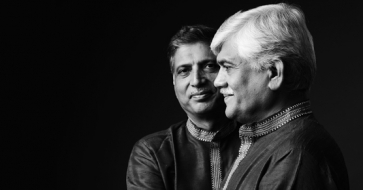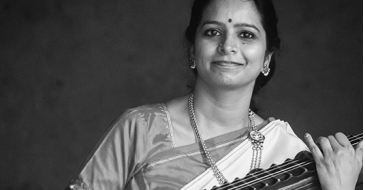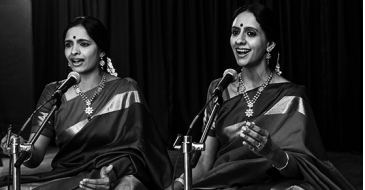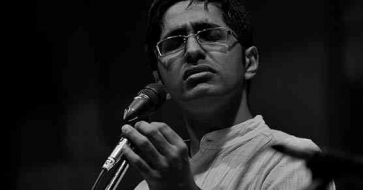You took a short break from performance recently. How does it feel to get back on stage after a four-month hiatus?
It feels great. I usually take some time off every year, but this was a concerted effort - on my part - to take a conscious break from performance.
The break allowed me both time and space to step back a little and breathe, let the air flow. I used the time to practice, to think and reflect upon music - my own and music at large, to spend quality time with my daughters and reconnect with extended members of the family. Overall, time well-spent!
What does it feel like to get back on stage?
Great, again! That’s where I belong, and that’s where I really come alive.
Does that getting back need preparation? When you are gearing up for a performance, you are, in a sense, getting ready to play a part? What’s that like?
Let me attempt to answer that by telling you a story. There was an unwritten rule in our home that whenever someone asked me to sing, I was to sing. No fuss, no excuses. My mother drilled it into my head that music indeed was a gift that was meant to be shared.
But as I stepped into my adolescence and into adulthood thereafter, I became conscious, inhibited. Self-doubt consumed me. I also began exercising a certain unspoken pressure upon myself about the way I wanted to sing or how I needed to sing, et al.
And then there came a time when I was performing regularly but I wasn’t satisfied whole-heartedly with my performance. Meaning, after a concert, when I went to bed, it wasn’t with a feeling of euphoria. That bothered me a lot. By nature, I was always the type that sought out for a mentor, for inspiration. Years later, that is how I found Eugene Rabine, a voice and sound expert from West Germany. I decided to meet him and went to Frankfurt.
On the evening we were to meet, he offered to pick me up from the train station in Frankfurt. That evening in 1988 is still vivid in my memory. On a deserted platform, dressed conspicuously in a sari, sipping one coffee after another, I patiently waited for Mr Rabine. An hour went by, then two, then three, then four. Dusk enveloped the platform and things got lonely, eerie even. I stayed on; something told me that Mr Rabine would not let me down.
He didn’t. A full four hours later, his wife walked into the platform, introduced herself and apologized for the delay. When we both reached the car, I found Mr Rabine’s foot swaddled in a fresh, large plaster. Well, the story was that while on his way to pick me up, Mr Rabine had met with an accident and landed with a fracture. So he went to the hospital, plastered his foot and returned to pick me up.
Needless to say, I had goosebumps and was almost in tears by the time we got home. Mr Rabine didn’t wait too long to get straight to business. He planted his foot on a chair, looked me straight in my eyes and said, “Why are you here?” In my state of utter shock and relief at the same time, I only managed to say, “Mr Rabine, I’m singing, but I’m not flying; I’m like a bird in a cage. Help me fly.” Pat came his reply, “Let’s get to work them!” For four days, thereafter, locked up in his studio, Mr Rabine generously introduced me to the idea of how the body needs to sing along with the voice. “It is your entire being that sings,” he said to me and gave me lessons on functional training, a methodology he had created and nurtured to help musicians discover their voice and its potential with it.
Four days later, after grueling sessions that involved physical activity along with voice training, I confessed to Mr Rabine that I really had no money left to pay him and therefore continue my lessons. So he struck a deal with me. “If you cook Indian food for my wife and I, I’ll teach you for four more days,” he said. And that’s how I spent four more days in the Rabine household. When I left Frankfurt, feeling lighter and with a happy heart, I thought about what he had told me; I was to sing and perform the way I was and not really worry too much, and meet him after two years.
A full 18 months later, almost like a miracle, everything changed. The nervousness I supposedly felt vanished. I found myself accepting my voice the way it was; it didn’t bother me if it was a katta (base) koral or netta (shrill) koral, sannamana (thin) koral or sannam illada (thick) koral… I didn’t fret about how I sounded; I just sang to express myself. And the moment I began doing that, I felt there was a shift in the way people responded to me.
Suddenly, singing and living became one and the same and I can say with confidence that there has been no looking back since!
For some odd reason, and I may be wrong, we use the word expression more in the context of dance. You talked about the body singing and music as a tool of expression. Can you elaborate a little?
For me, to sing is like a mean of unabashed expression; it’s like your soul speaking. You speak straight from your soul and directly with the people listening to you, and that’s how the connection happens.
But unless you are really comfortable with all your strengths and weaknesses, that connection can’t happen. Having said that, it also takes a journey to come to terms with the idea that you don’t have to be completely perfect; what is comfortable in itself is perfect.
You’ve been through that journey as well, right? Coming to terms and embracing all of your own insecurities?
Absolutely. Among the first things I had to come to terms with was the fact that I don’t have a typically female voice. I have a big voice and that needs more time to tame. I was also almost always inadvertently compared to the more melodious female voices that - in a sense - put me at a disadvantage. But once I began feeling comfortable in my shoes, and I already shared the story of how that came to be, I would just sing, no matter what.
I used the time away from my performances, to revisit, reconnect and reflect on my music. In a way, I am back to performing with a renewed spirit!
So attitude is also an important component here, right?
Oh yeah; and developing that attitude comes from building internal strength and accepting yourself as you are.
But the performance world is dynamic, no? One day you could fly, another day you may not soar? How do you cope with that?
Well if you ask me, what matters is consistency. Over ten performances, if you have succeeded in five, been mediocre in three and done badly in one, even two, I’d like to think I’m okay.
You’ve had bad days?
Of course. When you are adept enough at having done something for a long time, and you are having a bad day, you know it but your audience doesn’t. That’s the masking trick!
Speaking of masking, in today’s context, in a world where performance and packaging are used in the same breath, what is the challenge that goes into packaging art that is also as real and honest?
Over time, I’ve come to realize that all this fame and adulation that comes from performance, is momentary. I’d like to think that as a musician, I’m already at an advantage; privileged in a sense when compared to individuals who are struggling to get two meals in a day. Therefore, for starters, it’s truly a blessing that I’ve had the opportunity to pursue this art and nurture it.
Personally speaking, not many know that things didn’t really come to me easy either. I wasn’t always a star, so to speak. I’ve been through many years where I didn’t have an audience. Just so you know, my debut concert at the Music Academy was way back in 1973 and for a number of years, I was a completely anonymous singer who just came and went.
My life was also full. I was married, I had two children and initially I wasn’t really investing all my energies on a performance career. When I actually began to do that, I had a different set of problems. After learning music from my mother until the age of 10, and from Brindamma until the age of 25, I went on to learn from a number of teachers, like AS Mani (Tiger Varadachariar’s disciple), S Ramachandran (Chittoor Subramania Pillai’s disciple) , KS Narayanaswamy, the great veena maestro, TR Subramaniam, the renowned vidwan; I was gathering the moss and I had all the time to accumulate knowledge but honestly I had no real performance targets. After my children grew up and I finally woke up one morning with the conviction that I had to take my performances seriously is really when I began pursuing my career with focus.
That is really when I started performing a couple of concerts during the erstwhile December season of music and dance. But performing in Chennai during the season is an altogether different piece of cake; the audience here is used to nothing short of the best and can be very critical in its acceptance of a new artiste. And clearly I wasn’t ringing a bell with them.
So I’ve been through that arc too; and it has all been a learning curve. I know now fully well what it is to have performed to a near-empty audience and I know the highs of performing to an auditorium brimming with rasikas, who have waited from 4am in the morning to buy their tickets to the concert.

Everything is experiential in life, everything we learn through an experience stays close to our hearts. I feel that, in music, especially in Carnatic music, every song has a story; every song is a poem with characters and there is a story involved. It is art music but it is also very poetry-oriented… I feel that if I live that experience to the best of what I have experienced in so many years of living, I am passing on a story, an experience to my listeners, and that will really get them to participate and feel
That’s quite a test of endurance, right? And you persisted, doggedly…
I did. When I started taking things seriously and began re-discovering my music, so to speak, I’d often think of these questions - who am I? Why am I singing? What makes me happy while I sing? What is it that I love to sing? What is it that my audience will love? The more I thought about these, the more I gravitated back towards my early influences.
l was grateful for the strong and varied influences I’d had as a child; I was grateful for the strong foundation my mother and Brindama’s music had laid for me; it allowed me to handle – with ease - an abhang, a viruttam, a Thillana, an Oothukadu song and sing it all with equal vigour. So when I decided to culminate my musical experiences into my performance world, the audience heard a musician who was expressing herself with honesty, clarity and conviction. And really, what else are audiences looking for? They want someone to come and say something that rings true to them. Music is really that; it about communicating on a one-on- one basis.
How important is this relationship for you; the relationship between the audience and you?
This is an important question. And the simple answer to that is that I am a people’s person; I enjoy the company of people. So when I started performing, it was really an extension of my inherent personality. I wanted to reach out to people through my music and it was very important for me that they were able to relate to it.
When I perform, I want to be able to see my audience, look at their expressions, look at their faces and their eyes. In fact, almost always, if the auditorium is dark, I request the authorities to keep the lights on, because just as the audience wants to see us, I want to be able to see the audience and sing for them.
Some artistes say they sing for themselves and the audience participates in that experience, as a result of that. How different is it when you say you sing, so that the audience can participate collectively in that experience?
It is all a question of temperaments and it takes all sorts to make the world; there is no right or wrong here. One artiste can sing in a particular way and draw the entire audience into their fold and that is a certain kind of an experience. I sing and have a two-way traffic between the audience and me and that is another kind of an experience. It's really like different cups of tea, one is Assam, one is Darjeeling and yet another is Earl Grey!
You spoke about expression and expressing. When you are doing that, are you getting under the skin of a song? Are you unravelling its musicality, its melody, its poetry, its lyrics, the overall story; is expression then a culmination of all the various aspects that make a song?
Think about it. Of the movies you watched as a youngster, the ones that remain with you are the ones that have a great story to tell, right?
Whenever I sing Maadu Meikkum Kanne, I forget about the ragam, the tune and I actually visualize the mother and the son, Yashoda and Krishna. Visually, every time it’s a different version of Yashoda, a different version of Krishna and they are playing out this song in front of me. The moment that happens, the audience is happy to live that experience because you are living it.
People sometimes say that I always sing the same Kalinga Narthana Thillana. But would you believe me if I say that every time I sing this Thillana, I go back to Needamangalam Bhagavathar’s three-hour narration of the Thillana; I’m transported into that experience and every time I sing it, I attempt to give that story, a different flight of my imagination.
There is a particular line in the Thillana - mandasmitha kara vara pujitha…. Every time I get there, I can actually see Krishna dancing on the five-headed snake and smiling at me. Now this could well be a figment of my imagination, but I do give shape to it, and the moment I do so, the audience starts expressing its own visual of it - that is the power of vibration.
I am not doing anything that is not normal, I am doing something that is in nature. One person lives an experience and everybody gets it. At that point, the music is forgotten, lyrics are forgotten, it is just experience - it is about that little boy and that snake. If you distill everything and get rid of the baggage, it is the distilled experience that everyone collectively enjoys.
But by virtue of being a musical form that requires a certain level of intelligence to participate in its process, would you agree that this music is a bit inaccessible and therefore, elitist?
I agree, but I also disagree. In my experience, my audience has comprised of people from all sections of society. If you observe the very evolved souls, they have a child-like quality about them. They have gone through every experience in life and have finally returned to a point when they say that it’s finally about looking into people’s eyes and sharing that compassion. When you see Ramana Maharishi, you can see the compassion in his eyes. When I first watched Balamma (Bala Saraswati) perform Krishna Nee Begane, I only saw Krishna, I did not see the years of experience she had had as a dancer; that’s not the point, the point was she was able to re-create Krishna in her dance. In Tamil there is a proverb, Kalavum Katru Mara (even to steal you have to learn, but you shouldn’t do that)
Artistes go through a lot of knowledge, a lot of training but there comes a point in their lives when they just let go. The burden of that knowledge is finally distilled into something simple and when that happens, more and more people are drawn into it. You are not simplifying the music; you are keeping it away from too much of the scholastic burden that it carries.
When I give lecture demonstrations or compose and perform a complex Ragam, Thanam, Pallavi - that is another scholastic aspect of music. Both these aspects have to continue and co-exist.
Let me ask you, why do we still celebrate Shakespeare? Even after so many years he is still relevant. There are so many playwrights, yet Shakespeare stands tall and proud. Because the stories he weaved are all timeless. Likewise, Carnatic music. There are a lot of things in it that are timeless - be it mythology or devotion. I will not say remove one and keep the other.
For a particular picture to be created, this is its canvas and the life in the picture sprouts from that very same canvas, so why uproot it? The Ramayana and Mahabharata are still enjoyed by the lowest and highest sections of society; they are by no means elitist, right?
You were recently conferred the Sangitha Kalanidhi award. Congratulations on that! With awards and recognition aplenty, recognition aplenty, having gone through performances and being able to take a break from your performance career - do you feel that you have undergone a shift where both musically and personally, there has been an attitudinal shift in you?
Over the years, I can say with conviction that my music has most definitely become freer because after a point, you don’t have the pressure of targets. That is not to say that I am sitting in the Himalayas and singing for renunciation. I am still singing very much for audiences and I want to see my audience, I want to sing for them.
But now with the conferment of the Sangita Kalanidhi, my music has become even more liberated.
What do you mean?
For a Carnatic musician, this award is unarguably the highest. National awards are great yes, because the country recognizes you. But the Sangita Kalanidhi is as great because it is your own academia that has recognized you; it’s the collective validation from your fraternity, experts, critics, connoisseurs, musicologists, scholars, rasikas… It’s a validation of a life’s journey in music.
Being conferred the Sangita Kalanidhi, not only validates my musical journey; it also reminds me that I have done something that matters, and that it has been recognized by the academy
Was that your reaction upon being conferred the award?
Exactly.

We also live in an era where social media is the norm. You have gone through so many challenges and received the Sangita Kalanidhi which validates your hard work and endurance. But this is also in a world where mediocrity is celebrated, and with vengeance. A thirty-second video goes viral overnight and a celebrity is born. How do you respond to something like that, when you are an artiste who has gone through so much to get where you are versus someone who is instantly gratified?
Now, come on, can you talk about something which you have no control over? I cannot stop singing and go about converting people, preaching to them that mediocrity is not on.
Ultimately, every human being wants to be happy. I want to wake up looking forward to the day. I want to go to bed at night having been happy for the day, I want to look forward to life. There are certain human values that will never change, from the Mahabharata to now, they remain. And in a sense, we are all ultimately answerable to ourselves. If you are not on the right track, life will tell you; you will continue to be unhappy and the world will show you.
And finally, what has the experience of music taught you about life and what has the experience of art taught you about life?
There are many things when it comes to human beings. What I perceive myself as is one thing; what I want you to perceive of me is another; and what ultimately you perceive me as is quite another. There are at least three more layers to perception, which come into play in experiences - in relationships, in communication, in art, in everything.
Let me give you an example. Years ago, I once finished a kutcheri where, I sang an elaborate Aalapana and I was elated about my deftness with rendering the ragam. But there would be no reaction from the audience, nobody even got it and I was met with an an eerie silence at the end of it.
The thing is, if you really want to engage, you have to bring all these three layers equally and into almost the same latitude, so you are able to navigate through life. In my life, learning from my mother was one thing, learning from a great guru like Brindamma was another, learning from my four other gurus was very different. All these things were like a storehouse of my experiences but finally when the time came to test it all, I had to also negotiate aspects like what the audience thought of my music, what I wanted them to think and finally what the audiences perceived; all these had to come together, and this wasn’t easy!
I was lucky to have the positive energy that my husband, Sairam and my parents-in-law gave me - I would have given up on my musical performance journey long ago, had it not been for their support. My husband does not miss a single concert or event of mine and that gives me a lot of strength - he provides the anchor and motivation that keeps me going. My daughters, Maitreyi and Gayatri are my 'go to' friends at all times and their interest, pride in my growth and advise on the choices that I make, really makes it althemore meaningful for me.
I was also fortunate enough for two people, who came into our life by chance. I’m under oath not to reveal one of their identities, but the other person is Mr. Parvathinathan alias Mr. Balu. These two people started working with me and helped me shape my performances. It was like a nine to five schedule - everyday, the three of us would huddle into my home studio and each of them would give me feedback and suggest ideas on what would work and what wouldn’t. The music, I knew; the compositions, I knew; the improvisations; I knew; the Ragam Thanam Pallavis, I knew; but how to put it together, how to string it, how to present it, how is it being perceived by an audience; is something that these two people made me understand.
One of them came from a scholarly perspective and the other provided a rasika’s point of view. As mentors, they changed my perspective of music and its performance. I always think, when or if a top sportsman could have a mentor, a coach who would coach him right before his match, until the last match of his career, why not the same for Carnatic musicians? Why not for musicians in general? I really think mentors and coaches are important - we all need people we can trust and who are vested in our journey and exercises.
Interviewed by Akhila Krishnamurthy
0 comments Comments
SIGN UP TO RECEIVE OUR WEEKLY NEWSLETTER IN YOUR INBOX





